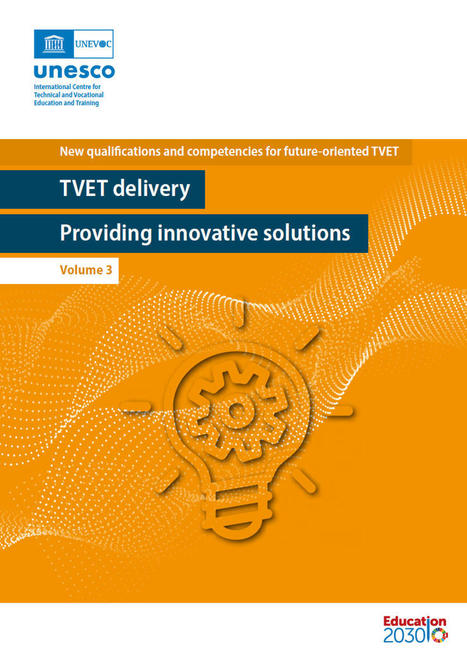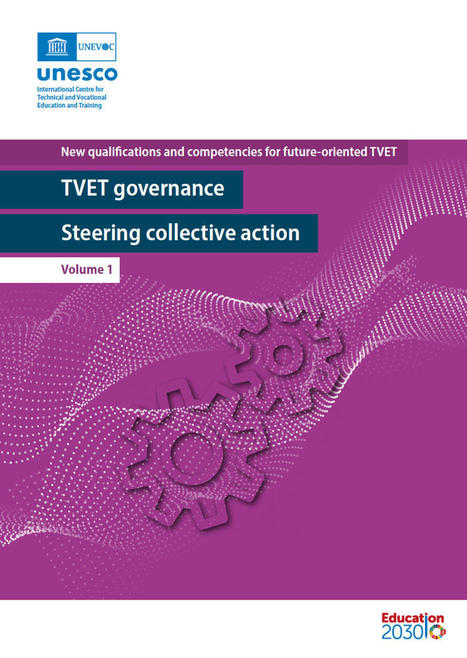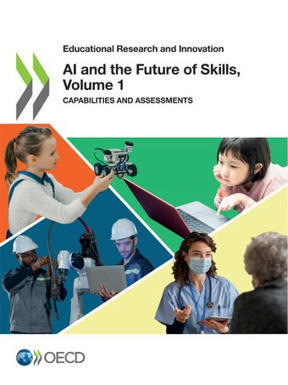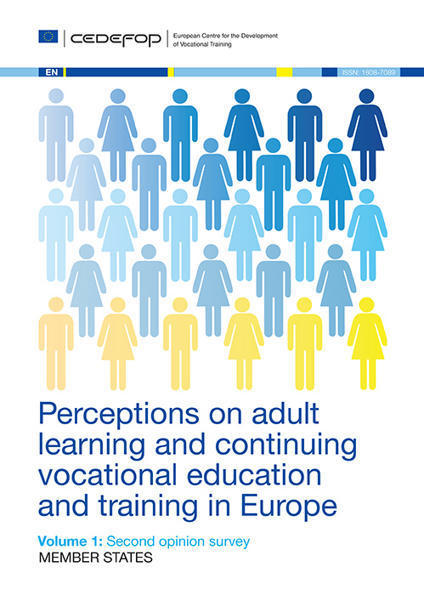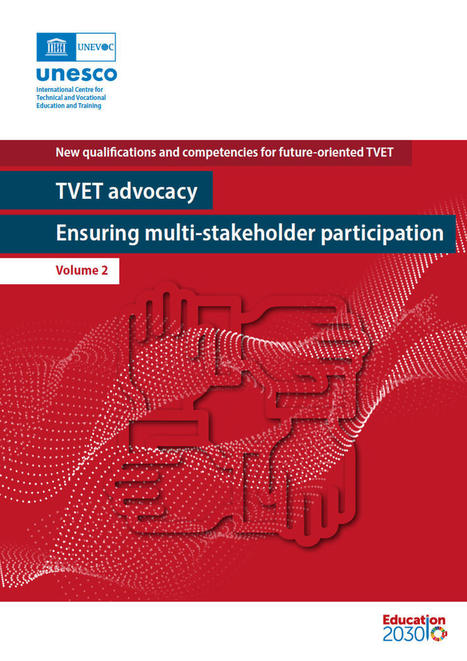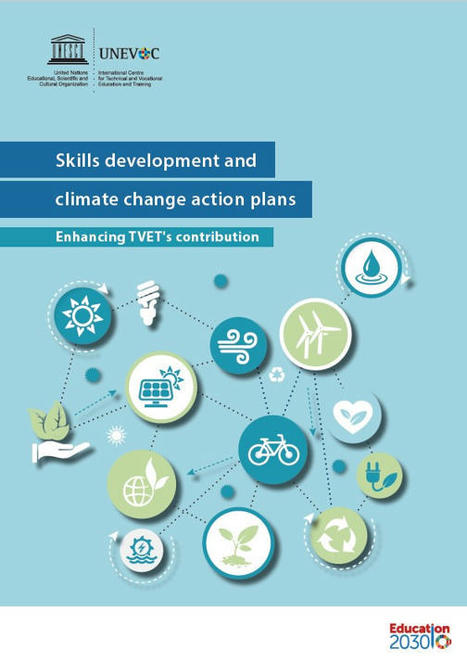 Your new post is loading...
 Your new post is loading...
This volume focuses on the micro-level stakeholders involved in the implementation of TVET skilling programmes and/or their components. It will suit lecturers, administrators and programme designers interested in understanding some of the challenges and opportunities of introducing new qualifications and competencies into TVET programmes.
The volume aims to address the role and contributions of TVET providers and companies in identifying, integrating and implementing new qualifications and competencies, drawing on contributions from literature as well as expert engagements and case studies. Readers are encouraged to explore the other two volumes for additional insights: ‘TVET advocacy: ensuring multistakeholder participation’ targets the meso level, and ‘TVET governance: steering collective action’ focuses on macro-level stakeholders.
This volume is written with the macrolevel or system-level stakeholder in mind. Macro level stakeholders can be any number of bodies with a mandate for collective action in TVET. This primarily covers ministries and statutory bodies with legally assigned duties in the governance of TVET.
Policy and operational managers interested in understanding some of the challenges and opportunities of introducing NQCs into TVET systems are most likely to benefit from the findings in this volume, but readers are encouraged to explore the other two volumes for additional insights: ‘TVET advocacy: ensuring multistakeholder participation’ targets meso-level stakeholders, while ‘TVET delivery: providing innovative solutions’ focuses on micro-level stakeholders.
Artificial intelligence (AI) and robotics are major breakthrough technologies that are transforming the economy and society. The OECD’s Artificial Intelligence and the Future of Skills (AIFS) project is developing a programme to assess the capabilities of AI and robotics, and their impact on education and work. This volume reports on the first step of the project: identifying which capabilities to assess and which tests to use in the assessment. It builds on an online expert workshop that explored this question from the perspectives of both psychology and computer science. The volume consists of expert contributions that review skills taxonomies and tests in different domains of psychology, and efforts in computer science to assess AI and robotics. It provides extensive discussion on the strengths and weaknesses of different approaches, and outlines directions for the project. The report can therefore be a resource for the research community of multiple fields and policy makers who wish to obtain deeper insight into the complexity of machine capabilities.
This document is the principal outcome of an ambitious collaborative project between Concordia University and Dawson College to co-construct an artificial intelligence (Al) competency framework that supports the creation of success pipelines for learners from college to university to lifelong learning. The aim is to provide a flexible tool for educators, program developers, recognition of acquired competencies (RAC) coordinators, and other stakeholders engaged with developing curriculum and training programs that address ever-evolving Al talent needs. Growing evidence for an accelerating rate of digital transformation further amplified by the worldwide coronavirus pandemic, motivated us to look toward curriculum frameworks that are general in focus. For this reason, we have clustered AI competencies that may be used in varied higher education contexts along the pipeline for the pressing needs of today while being adaptable and extensible for the future.
The AI competency framework is a result of extensive consultation with subject matter experts, instructional designers, and program development professionals. It serves as a curriculum development resource that can balance the technical, business, and human domains with ethics and civics in educational programs and professional training. Since the competencies are modular, they can be combined to fit specific objectives and program goals.
In the face of numerous challenges and in persevering through the pandemic conditions, our team proudly celebrates the achievement of this work. It points to our shared responsibility in higher education to accompany learners through the acquisition of skills and knowledge along paths toward a lifetime of learning for the good of all. This also marks the beginning of a new phase of collaboration with opportunities to partner, innovate, and tackle education challenges in the age of AI. We hope that this AI competency framework user guide will be a valuable addition to your AI education toolkit.
The following study on "Technical and Vocational Education and Training (TVET) mapping for refugees, asylum seekers and host communities" was conducted in Egypt under the framework of PROSPECTS, the partnership for "Improving prospects for forcibly displaced persons and host communities". This TVET mapping exercise falls under the first pillar of PROSPECTS, “Education and Learning”, which focuses on increasing the access of refugees, asylum seekers, and Egyptians within the host communities, to quality technical and vocational education and training opportunities, with a focus on Greater Cairo, Alexandria, and Damietta.
The overall objective of the study is to map the relevant features of the country’s formal and non-formal TVET system that facilitate or hinder the access of refugees at the national level, and to assess the capacity of local formal and non-formal TVET providers in the three main areas of interventions of the programme.
This report explores the opportunities presented by Educational Technology (EdTech) for technical and vocational education and training (TVET) systems worldwide, with particular emphasis on developing countries. The report discusses how digitization is transforming the role of EdTech in TVET and skills development
The emergence of new technologies will change the skill sets needed to succeed at work: by 2030, a higher share of professions will require university degrees, and more work activities will require socio-emotional and technology skills. Over the next two decades, around 127 million young people are expected to enter the region’s labor force.
This report provides a general snapshot of the digitalization of TVET and skills systems in a set of countries. The primary data are derived from a desktop literature review on 8 countries, namely Angola, Gabon, Liberia, Ivory Coast, Mauritius, Morocco, Rwanda and Uganda and a set of questions administered through a questionnaire to experts and practitioners in the TVET sectors of Ivory Coast, Mauritius, Morocco, Rwanda and Uganda.
Mentorship is considered a gold standard approach for onboarding new hires. Several Top Fleet Employers have embraced mentorship programs into their onboarding process, helping to cultivate and support a resilient workforce.
This Guide aims to assist ILO constituents and technical and vocational education and training (TVET) practitioners to strengthen the role of skills development policies and programmes in peacebuilding efforts through inclusive learning methodologies and the training of relevant core skills. Promoting Social Cohesion and Peaceful Coexistence in Fragile Contexts through # TVET - Guide for TVET practitioners En français. Promouvoir la cohésion sociale et la coexistence pacifique dans les situations de fragilité grâce à l’Enseignement et Formation Techniques et Professionnels (EFTP) @ilo
This report summarizes the conversation from a National Best Practices Forum. Participants discussed effective strategies to help prepare apprentices for the Red Seal multiple-choice certification exam.
There is an increasing shift of attention from expanding apprenticeships to improving their quality and effectiveness. This brings into focus how apprenticeship is governed for greater relevance and matching to labour market needs, and how the content of what is taught at the workplace is designed and delivered.
|
This volume addresses the role of meso-level TVET stakeholders in the process of maintaining and updating TVET systems to ensure they remain fit for purpose. Meso-level stakeholders indicate institutions participating in the advancement of TVET systems. Of particular note in this document are organizations covering activities in specific economic sectors, such as business membership organizations (BMOs), trade unions, joint organizations or chambers of commerce, industry or crafts.
This volume is intended to give meso-level TVET stakeholders a better understanding of their role in the greater TVET ecosystem; potential tools for identifying, integrating and implementing NQCs for a TVET system; and action items for closer collaboration with other stakeholders. Readers are encouraged to explore the two other BILT NQC volumes for additional insights: ‘TVET governance: steering collective action’ targets macro-level stakeholders, while ‘TVET delivery: providing innovative solutions’ focuses on micro level stakeholders.
Artificial intelligence (AI) and robotics are major breakthrough technologies that are transforming the economy and society. The OECD’s Artificial Intelligence and the Future of Skills (AIFS) project is developing a programme to assess the capabilities of AI and robotics, and their impact on education and work. This volume reports on the first step of the project: identifying which capabilities to assess and which tests to use in the assessment. It builds on an online expert workshop that explored this question from the perspectives of both psychology and computer science. The volume consists of expert contributions that review skills taxonomies and tests in different domains of psychology, and efforts in computer science to assess AI and robotics. It provides extensive discussion on the strengths and weaknesses of different approaches, and outlines directions for the project. The report can therefore be a resource for the research community of multiple fields and policy makers who wish to obtain deeper insight into the complexity of machine capabilities.
Climate change is an ongoing process that, at the current pace of such activities, cannot be avoided. Tools have been proposed to deal with climate change focus on adaptation and mitigation. Strengthening national and international awareness of and commitment to reducing the impact of climate change has become the only viable option to ensure the sustainability of life on Earth.
This discussion paper compiles and reviews relevant information regarding the country submissions (Nationally Determined Contributions and National Communications) in fifty-seven selected countries. The paper summarizes key information that helps assess the ongoing and potential contribution of TVET to the realization of climate change action plans.
Taking fullyintoaccountthat the rapid development of AI technologies challenges their ethical implementation and governance, as well as the respect for and protection of cultural diversity, and has the potential to disrupt local and regional ethical standards and values,1.Adoptsthe present Recommendation on the Ethics of Artificial Intelligenceon this twenty-third day of November 2021;2.Recommendsthat Member States apply on a voluntary basis the provisions of this Recommendation by taking appropriate steps, including whatever legislative or other measures may be required, in conformity with the constitutional practice and governing structures of each State, to give effect within their jurisdictions to the principles and norms of the Recommendation in conformity with international law, including international human rights law;3.Alsorecommendsthat Member States engage all stakeholders, including business enterprises, to ensure that they play their respective roles in the implementation of this Recommendation; and bring the Recommendation to the attention of the authorities, bodies, research and academic organizations, institutions and organizations in public, private and civil society sectors involved in AI technologies, so that the development and use of AI technologies are guided by both sound scientific research as well as ethical analysis and evaluation -4-3.Recommande également aux États membres d’impliquer toutes les parties prenantes, y compris les entreprises, afin de veiller à ce qu’elles jouent leurs rôles respectifs dans la mise en œuvre de la Recommandation, et de porter la présente Recommandation à la connaissance des autorités, organismes, instituts de recherche et organismes universitaires, et institutions et organisations des secteurs public, privé et de la société civile engagés dans les technologies de l’IA, afin que le développement et l’utilisation des technologies de l’IA soient guidés par des recherches scientifiques de qualité ainsi que par une analyse et une évaluation éthiques
The pandemic accelerated existing trends in remote work, e-commerce, and automation, with up to 25 percent more workers than previously estimated potentially needing to switch occupations.
Before COVID-19, the largest disruptions to work involved new technologies and growing trade links. COVID-19 has, for the first time, elevated the importance of the physical dimension of work. In this research, we develop a novel way to quantify the proximity required in more than 800 occupations by grouping them into ten work arenas according to their proximity to coworkers and customers, the number of interpersonal interactions involved, and their on-site and indoor nature.
Understanding the gender dynamics in educational transitions can help target policies to support equitable access to education as well as its quality and labour-market outcomes. In almost all OECD countries, the gender gap in favour of women is wider in tertiary education than at upper secondary level. Differences in programme orientation and girls’ educational performance at school may give them greater access to tertiary education than boys. Changes in the courses on offer in higher education, and the social value of a university education for young women may also influence their choices. In addition, young women tend to gain more from a tertiary degree in the labour market than their male peers, both in terms of employment and earnings, which may make pursuing higher education more attractive.
In the context of global transitions, such as the green and digital revolutions, economies and labour markets are set to undergo major transformations, and future partnerships will have to tackle the short, medium and long-term needs resulting from these changes. To this end, identifying skills that are necessary today or will become important in the future is crucial. Due to demographic trends, the EU will soon face increasing workforce replacement needs while the young populations in southern Mediterranean countries are expected to grow exponentially.
During the COVID-19 pandemic, despite all of the disruptions the pandemic has caused, post-secondary education (PSE) has maintained educational programs, contributed research to the pandemic response and other critical areas, and provided experts for myriad science tables, task forces, and committees key to public health and government decision-making. While we applaud the hard work and commitment of faculty, staff, and students, we must also recognize that the pandemic effort has stretched already strained PSE resources and people even further. The cost of this cannot be ignored. It is critical to support PSE’s recovery so that it can continue to support Canada’s pandemic recovery, maintain Canada’s global position in research and international education, and continue to advance national interests in vital areas such as climate change, reconciliation, and information literacy.
This Labour Market Information report shares the details of the costs of the labour shortage across the trucking and logistics sector. Retirements and voluntary turnover increased over the course of the pandemic, complicating the challenge of filling vacant positions. Employers in trucking and logistics would benefit greatly if they could attract workers from other sectors of the economy, especially people whose experience and skills would quickly make them productive employees. Click here to edit the content
The report sheds light on changing demand for skills in digital economies and societies, based mostly on a literature review, supported by a set of case studies from low- and middle-income countries. It reviews different approaches to measuring digital skills, and discusses the impact of digitalization on skills and related policy recommendations. It shows that, while digitalization may vary widely in its extent and forms across countries and sectors, its impact on jobs and skills is nevertheless considerable everywhere.
The report contributes to a better understanding of the key skills implications of the digitalization process and helps to address the fundamental challenge of how skills and lifelong learning systems should respond to the rapid pace of technological and structural change brought about by digitalization.
What does the future hold for Canada’s labour market? What trends in technology, society, and the environment are in store for Canada’s labour market, and how will it impact the way we work? What skills will be in-demand across geographies, industries, and demographic groups?
These were the questions that the Brookfield Institute set out to answer over the last three years via the Employment in 2030 initiative. It combined futures research, expert workshops, and a machine-learning algorithm to generate the Forecast of Canadian Occupational Growth (FCOG), a forecast of skills demand and occupational growth in 2030.
|



 Your new post is loading...
Your new post is loading...

